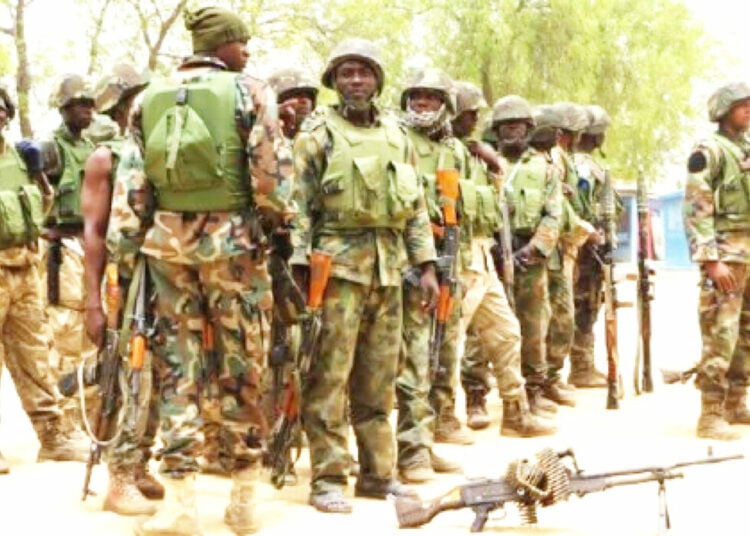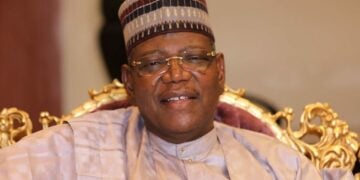The Northern Elders’ Forum (NEF) has called on President Bola Tinubu to declare a state of emergency in Northern Nigeria, citing the extraordinary scale of insecurity and the government’s constitutional obligations to protect lives.
The forum pointed out that government security agencies are overstretched, underfunded, and sometimes compromised, leaving citizens vulnerable—all of which erode public trust.
In a communiqué signed on Wednesday by its spokesperson, Professor Abubakar Jika Jiddere, the forum expressed grave concern over the spate of violent attacks, abductions and killings across the region, warning that continued inaction could threaten Nigeria’s stability and regional peace.
The NEF recalled the 19 August attack on a mosque in Unguwan Mantau Village, where armed assailants killed at least 27 worshippers during early morning prayers, leaving several injured and displacing hundreds.
It also condemned the execution of 35 abductees in Zamfara State despite ransom payments, as well as two separate attacks in Kaduna State’s Kauru and Kudan local government areas (LGAs) which left eight dead and eight others severely injured.
Jiddere said: “These incidents are not isolated cases; instead, they are part of a persistent pattern of organised criminal violence and banditry that have claimed thousands of lives, displaced hundreds of thousands of citizens, undermined food security, crippled economic activity, and inflicted deep psychological and social trauma on individuals and several communities.
“The NEF observes with deep regret that the state security architecture remains inadequate, overstretched, and in some cases complicit through inaction and silence, leaving citizens vulnerable and helpless while eroding public trust in government institutions.”
He cited the 1999 Constitution, the African Charter on Human and Peoples’ Rights, and the International Covenant on Civil and Political Rights, which protect the life of the individual.
“Article 6 of the International Covenant on Civil and Political Rights (ICCPR) states that the inherent right to life shall be protected by law, and no one shall arbitrarily be deprived of life.
“The recurring atrocities in Northern Nigeria constitute serious breaches of these obligations, and in their scale and persistence, will amount to crimes against humanity under international law and humanitarian cases,” he said.
NEF’s Demands
The Northern Elders’ Forum urged the federal government to declare a state of emergency in Northern Nigeria; deploy adequately trained, armed, and equipped security forces to protect civilian populations and secure international border regions; and provide adequate compensation, rehabilitation, and humanitarian assistance to victims, including displaced persons, in line with international humanitarian standards.
The group also called for the strengthening of border control and regional cooperation with neighbouring states under ECOWAS and the African Union protocols to stem cross-border incursions by armed criminal groups.
The northern elders also urged the federal government to seek technical and humanitarian support from international partners, including the African Union (AU) and the United Nations (UN).
The NEF stressed that continued inaction or insufficient responses to all these security challenges will exacerbate human suffering and jeopardise national cohesion, democratic sustainability, political stability, and regional peace.
NEF called on the government to act immediately, decisively, transparently and in complete alignment with Nigeria’s domestic and international obligations.
The forum pledged to continue monitoring developments while engaging stakeholders nationally and internationally to ensure urgent relief for affected Northern communities.
Military Force Necessary But Not Sufficient To End Insurgency – Badaru
For the Minister of Defence, Alhaji Mohammed Badaru, while military force is necessary in the fight against terrorism and insurgency, it is insufficient to deliver sustainable peace in West Africa and the Sahel region.
Badaru stated this on Wednesday in Abuja at the opening of the Regional Conference on Combating Emerging Terrorist Groups and Strengthening Sustainable Security in the ECOWAS and Sahel Region, organised by the National Counter Terrorism Centre (NCTC).
He said the region must look beyond battlefield victories to address the root causes of radicalisation, such as poverty, unemployment, exclusion and weak governance.
According to him, extremist groups thrive in environments where grievances are left unaddressed and institutions are either weak or absent.
“The task before us is straightforward. We must combine military strength with governance reforms and socio-economic development.
“Winning the hearts and minds of our populations will deny extremist groups the local support they seek to exploit.
In his remarks, the Chief of Defence Staff (CDS), Gen. Christopher Musa, said that military victories alone would not guarantee lasting peace in the fight against terrorism and violent extremism in West Africa and the Sahel.
General Musa, who was represented by the Chief of Defence Operations, Maj.-Gen. Emeka Onumajuru, noted that terrorist groups across the region were exploiting porous borders, ungoverned spaces, and local grievances to spread instability.
He added that their operations, from kidnappings and banditry to radicalisation and illicit trafficking, posed grave threats to collective security.
“The Armed Forces have been at the forefront of this fight for Nigeria.
Africa, Now Global Terrorism Epicentre, Says UN
The United Nations (UN) has warned that Africa, especially West Africa and the Sahel, has overtaken the Middle East as the new hub of global terrorism, accounting for the highest fatalities and most terrorised countries in 2024.
The UN Special Representative of the Secretary-General for West Africa and the Sahel, Leonardo Simão, raised the alarm on Wednesday in Abuja.
He said terrorist groups in the Sahel had become more sophisticated, posing threats to the entire region.
Simão spoke at the opening of the Regional Conference on Combating Emerging Terrorist Groups and Strengthening Sustainable Security in the ECOWAS Region and the Sahel, organised by the National Counter Terrorism Centre (NCTC).
He quoted the 2025 Global Terrorism Index as saying, “West Africa and the Sahel accounted for most fatalities in 2024”, an increase from the previous year.
According to him, among the ten countries most impacted by terrorism worldwide, five are in the region, with Burkina Faso now ranked the most terrorised country in the world, displacing Pakistan.
“The global terrorism landscape is shifting at an alarming rate. Groups are forging alliances, expanding their reach, and employing advanced technologies, such as drones, encrypted communications, and cyber tools to execute strikes with greater precision and heightened psychological impact,” he said.
Simão painted a grim picture of the human toll of insecurity, saying that in 2024 alone, 1,364 children were recruited by armed groups across six countries.
He added that 466 cases of sexual violence were documented, and 14,364 schools were shut down due to insecurity.
According to him, these numbers represent stolen futures, fractured communities, and deepening fragility.
While acknowledging rising defence spending in the region, he cautioned that military action alone cannot end the crisis.
“The Central Sahel is projected to spend USD 3.2 billion on defence in 202
5, diverting resources from education, health, and climate adaptation.
“We need a holistic approach—combining military interventions with political dialogue, improved social services, and sustainable development, paying particular attention to youth and women,” he said.
On regional efforts, Simão commended ECOWAS for its recent outreach to the Alliance of Sahel States (AES).
“The achievement to preserve the free movement of goods and people shows that dialogue can still prevail, even amid profound political and security crises,” he added.
Also speaking, ECOWAS Commissioner for Political Affairs, Peace and Security, Amb. Abdel-Fatau Musah, represented by Dr Cyriaque Agnekethom, said the bloc was moving to operationalise a regional anti-terrorism force.
He stressed that beyond the military option, ECOWAS was committed to suffocating the supply chains of terrorist networks.
“Only a few days ago, our Ministers of Defence and Finance agreed on funding modalities for the ECOWAS Regional Force.
“Two options are on the table—a 5,000-man brigade with a first-year cost of $2.61 billion, or a phased 1,650-man force costing $481.5 million.
“We must intercept and cut off weapons and ammunition, fuel, illicit funds, drugs, and dual-use items like fertilisers and batteries used to fabricate IEDs,” he said.
Musah commended Nigeria’s leadership, the UN, and the AU for ensuring that ECOWAS citizens were protected from the menace and that the community continued to thrive.
In his remarks, the National Coordinator of the National Counter Terrorism Centre (NCTC), Major General Adamu Laka, said Nigeria had conducted eight phases of terrorism-related trials, leading to 775 convictions, as part of efforts to strengthen accountability and uphold the rule of law in the fight against violent extremism.
Laka said the trials demonstrated Nigeria’s resolve to pursue justice through lawful processes while providing avenues for rehabilitation and reintegration of repentant fighters.
“So far, we have conducted eight phases of terrorism trials with 775 convictions.
“This sends a clear message that terrorism will not go unpunished, and at the same time, our approach recognises the need for non-kinetic measures such as dialogue, reconciliation, empowerment, and community resilience,” he said.
He explained that Nigeria’s counterterrorism efforts were anchored on the “whole-of-government” and “whole-of-society” approaches, bringing together state institutions, civil society, religious and traditional leaders, the private sector, and youth.
The NCTC boss stressed that while military actions remained important, sustainable security required winning hearts and minds, restoring trust in governance, and addressing root causes of terrorism such as poverty, unemployment, and social exclusion.
He also recalled that Nigeria hosted the African Counter Terrorism Summit in April 2024, which produced the Abuja Declaration that recognised the Centre as a Regional Centre of Excellence for Counter Terrorism in West Africa and the Sahel.
Laka said the current regional conference was designed to consolidate that mandate by deepening regional cooperation and producing actionable recommendations.





